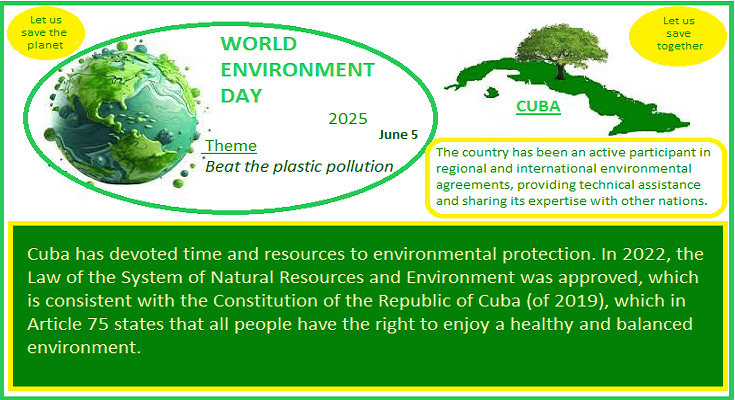Today, June 5, when World Environment Day is celebrated around the world, it is worth noting that Cuba has devoted time and resources to environmental protection. In 2022, the Law of the System of Natural Resources and Environment was approved, which is consistent with the Constitution of the Republic of Cuba (of 2019), which in Article 75 states that all people have the right to enjoy a healthy and balanced environment; that the State protects the environment and natural resources of the country; and recognizes its close link with the sustainable development of the economy and society to make human life more rational and ensure the survival, welfare and security of current and future generations.
Cuba has long been recognized for its rich cultural heritage, vibrant cities, and stunning natural beauty. However, what sets this island nation apart from its regional counterparts is its unwavering commitment to environmental protection and sustainability. Despite facing numerous socio-economic challenges, Cuba has emerged as a trailblazer in the fight against climate change, biodiversity loss, and ecosystem degradation.
Cuba’s environmental journey began in the early 1990s, when the collapse of the Soviet Union led to a severe economic crisis. Faced with the prospect of widespread famine and energy shortages, the Cuban government turned to sustainable agriculture and renewable energy as a means of survival. This marked the beginning of a remarkable transformation, as Cuba transitioned from a heavily industrialized nation to a champion of eco-friendly practices.
Today, Cuba boasts an impressive array of environmental achievements. The country is home to an extensive network of protected areas, covering over 20% of its territory. These natural reserves provide a safe haven for an incredible array of flora and fauna, including several endemic species found nowhere else on the planet. The Zapata Swamp, a UNESCO Biosphere Reserve, is a prime example of Cuba’s conservation efforts. This vast wetland, stretching over 4,500 square kilometers, is a vital breeding ground for crocodiles, manatees, and a diverse range of bird species.
Cuba’s dedication to renewable energy is another area where it excels. With a goal of generating 24% of its electricity from renewable sources by 2030, the country is aggressively pursuing solar, wind, and hydroelectric power projects. This commitment has led to a significant reduction in greenhouse gas emissions, making Cuba one of the most carbon-efficient nations in the Western Hemisphere.
Sustainable agriculture is another area where Cuba is making significant strides. The country’s emphasis on organic farming practices has not only improved crop yields but also reduced its reliance on chemical pesticides and synthetic fertilizers. This approach has also promoted local food systems, providing fresh produce to urban populations while supporting rural communities.
Cuba’s environmental leadership extends beyond its national borders. The country has been an active participant in regional and international environmental agreements, providing technical assistance and sharing its expertise with other nations. The Cuban government has also launched several initiatives aimed at promoting sustainable tourism, which not only generates revenue but also raises awareness about the importance of environmental conservation.
Despite these accomplishments, Cuba still faces significant environmental challenges. The country is highly vulnerable to climate change, with rising sea levels and increased hurricane activity posing a significant threat to its coastal ecosystems and infrastructure. Deforestation, soil degradation, and pollution from industrial and agricultural activities remain pressing concerns that require continued attention and investment.
Cuba’s commitment to environmental protection and sustainability serves as a beacon of hope for the Caribbean region and beyond. As the global community grapples with the challenges of climate change, biodiversity loss, and ecosystem degradation, Cuba’s experiences offer valuable lessons in innovation, resilience, and cooperation. As the world looks to the future, Cuba’s environmental stewardship stands as a testament to the power of collective action and the importance of prioritizing the health of the planet.




